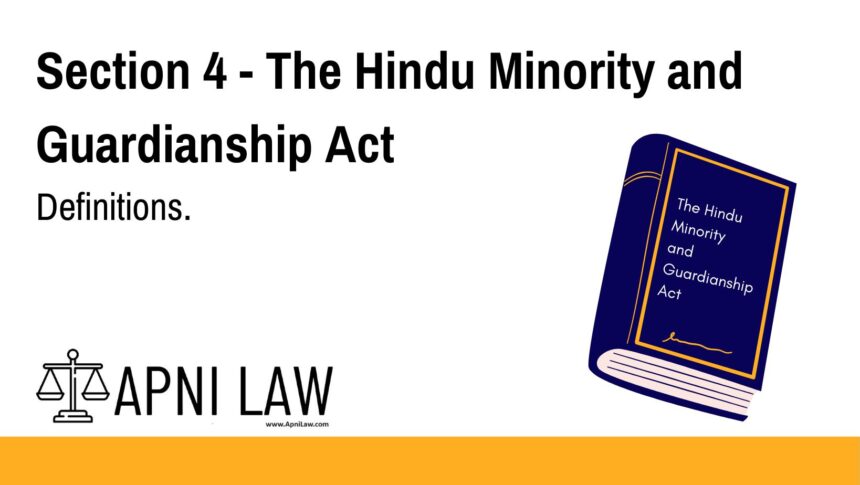Code
In this Act, —
(a) “minor” means a person who has not completed the age of eighteen years;
(b) “guardian” means a person having the care of the person of a minor or of his property or of both his person and property, and includes —
(i) a natural guardian,
(ii) a guardian appointed by the will of the minor’s father or mother,
(iii) a guardian appointed or declared by a court, and
(iv) a person empowered to act as such by or under any enactment relating to any Court of Wards;
(c) “natural guardian” means any of the guardians mentioned in section 6.
— Section 4, The Hindu Minority and Guardianship Act, 1956
Explanation
Section 4 lays the foundation for the terminology used throughout the Act. It defines key terms — “minor,” “guardian,” and “natural guardian” — that determine who is subject to and who can exercise powers under the Act.
Key Terms Defined
Minor
-
A person below 18 years of age.
-
Note: If a guardian is appointed by a court, the age of majority is extended to 21 years under the Indian Majority Act, 1875.
Guardian
-
A person responsible for the minor’s care — of their person, property, or both.
-
Types of guardians:
-
Natural guardian (typically a parent)
-
Testamentary guardian (appointed by a will)
-
Court-appointed guardian
-
Guardian empowered by a statute (like Court of Wards)
-
Natural Guardian
-
As defined in Section 6 of the Act (e.g., father and mother in order of priority for a Hindu minor child).
Notes for Context
-
The definition of guardian is inclusive, meaning the Act can recognize other guardians if included under related laws.
-
This section supports other key provisions like Section 6 (natural guardianship), Section 8 (powers of natural guardian), and Section 9 (testamentary guardians).
Illustration
🔹 Example: Ramesh is 17 years old and his property is managed by his uncle (appointed by his father’s will).
→ Under this section, Ramesh is a minor and his uncle is a testamentary guardian.
🔹 Example: An unmarried 16-year-old girl lives with her mother after her father’s death.
→ She is a minor, and her mother is her natural guardian under Section 6.
Conclusion
Section 4 of The Hindu Minority and Guardianship Act provides the essential definitions that apply throughout the Act. Understanding these terms is critical to interpreting the Act’s other provisions regarding guardianship, the powers of guardians, and the rights of minors.








